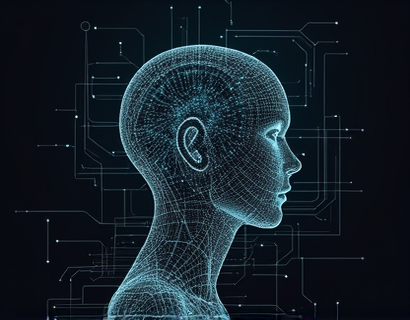Maximizing Productivity with Intelligent AI Task Managers: Streamlining Personal and Professional Life
In the fast-paced world of today, productivity has become a crucial factor for success in both personal and professional spheres. The integration of intelligent AI task managers represents a significant leap forward in managing daily tasks efficiently. These AI-driven agents are designed to intelligently handle a wide range of tasks, from scheduling appointments to managing complex projects, thereby allowing individuals to concentrate on high-priority activities that truly matter. This article delves into the transformative impact of intelligent AI task managers on productivity, exploring how they streamline daily operations and enhance efficiency.
The concept of using AI to manage tasks is not new, but recent advancements in machine learning and natural language processing have made these tools more sophisticated and user-friendly. Intelligent AI task managers are not just about automating repetitive tasks; they are about understanding user preferences, predicting needs, and adapting to changing circumstances. This level of intelligence enables these agents to prioritize tasks effectively, ensuring that users can focus on strategic decision-making and creative work.
Understanding AI Task Managers
AI task managers are software applications powered by artificial intelligence algorithms that assist users in organizing and managing their tasks. These tools leverage various AI techniques such as machine learning, natural language understanding, and predictive analytics to provide a seamless and intuitive user experience. Unlike traditional task management tools, AI task managers can learn from user behavior, adapt to new inputs, and improve over time without being explicitly programmed.
One of the key features of AI task managers is their ability to integrate with other applications and services. This integration allows for a unified workflow where tasks can be created, updated, and managed across multiple platforms without manual intervention. For instance, an AI task manager can automatically sync with a user's calendar, email, and project management tools, ensuring that all tasks are up-to-date and accessible from any device.
Enhancing Personal Productivity
For individuals, AI task managers can significantly enhance personal productivity by taking care of mundane tasks and providing personalized recommendations. Imagine starting your day with a clear list of tasks prioritized based on urgency and importance, without having to manually organize them. AI task managers can do just that, freeing up mental space and reducing stress.
These tools can also help in time management by suggesting optimal times for task execution based on historical data and current schedules. For example, if a user tends to be more productive in the morning, the AI can prioritize critical tasks for that time slot. Additionally, AI task managers can remind users of upcoming deadlines and suggest breaks to maintain focus and prevent burnout.
Another significant benefit is the ability to handle recurring tasks automatically. Whether it's setting reminders for weekly meetings, scheduling monthly reports, or reminding you to take medication, AI task managers can handle these responsibilities with precision. This automation not only saves time but also reduces the risk of human error.
Boosting Professional Productivity
In a professional setting, the impact of AI task managers is equally profound. Business professionals often juggle multiple projects, meetings, and communications, making it challenging to maintain productivity and focus. AI task managers can streamline these processes by providing a centralized hub for task management.
For project managers, AI task managers offer advanced features such as task delegation, progress tracking, and team collaboration. These tools can assign tasks to team members based on availability and workload, ensuring that projects stay on track. Real-time updates and notifications keep everyone informed, reducing the need for constant check-ins and meetings.
AI task managers can also assist in data analysis and reporting. By integrating with various data sources, these tools can generate insights and visualizations that help in making informed decisions. For instance, a project manager can receive a summary report highlighting key metrics and areas of concern, allowing for quick adjustments to project plans.
Integration with Smart Devices
The convenience of AI task managers is further enhanced by their integration with smart devices. Voice-activated assistants, smart home devices, and wearables can all be connected to these tools, enabling hands-free task management. For example, a user can add a task to their list by simply speaking to a smart speaker, or receive a notification on their smartwatch about an upcoming meeting.
This seamless integration makes AI task managers accessible anytime and anywhere, ensuring that users can stay productive even on the go. Whether you're at home, in the office, or traveling, these tools adapt to your environment and continue to support your productivity goals.
Customization and Personalization
One of the most appealing aspects of AI task managers is their ability to customize and personalize the user experience. Each user has unique preferences and work styles, and intelligent AI task managers are designed to accommodate these differences. Users can tailor the interface, set custom rules, and define specific workflows that align with their needs.
For instance, a user might prefer to receive task reminders via email rather than notifications, or they might want to categorize tasks based on custom labels. AI task managers can learn these preferences over time and adjust their behavior accordingly, providing a more intuitive and efficient experience.
Challenges and Considerations
While the benefits of AI task managers are clear, there are also challenges and considerations to keep in mind. One of the primary concerns is data privacy and security. Since these tools often handle sensitive information, it's crucial to choose reputable providers that prioritize user data protection. Look for tools that offer end-to-end encryption, regular security updates, and transparent privacy policies.
Another consideration is the learning curve associated with adopting new technology. While AI task managers are designed to be user-friendly, some users might initially find it challenging to transition from traditional task management methods. Providers can mitigate this by offering comprehensive onboarding processes, tutorials, and customer support.
Future Trends in AI Task Management
The future of AI task management is exciting, with several trends shaping the evolution of these tools. One significant trend is the integration of augmented reality (AR) and virtual reality (VR) to create immersive task management experiences. Imagine visualizing project timelines in 3D or interacting with virtual assistants in a VR environment, making task management more engaging and intuitive.
Another trend is the incorporation of emotional intelligence into AI task managers. By understanding user emotions and stress levels, these tools can provide more empathetic support and recommendations. For example, if a user is showing signs of stress, the AI might suggest a break or adjust the task priority to reduce pressure.
Additionally, the rise of decentralized AI and blockchain technology could lead to more secure and user-controlled task management systems. Users would have greater control over their data and how it's used, enhancing trust and adoption of these tools.
Conclusion
Intelligent AI task managers are revolutionizing the way we manage our personal and professional lives. By automating routine tasks, providing personalized recommendations, and integrating seamlessly with other tools, these agents enable users to focus on high-priority activities and achieve more with enhanced efficiency. As technology continues to advance, the potential for AI task managers to transform productivity is immense. Embracing these tools can lead to a more organized, stress-free, and successful life.











































